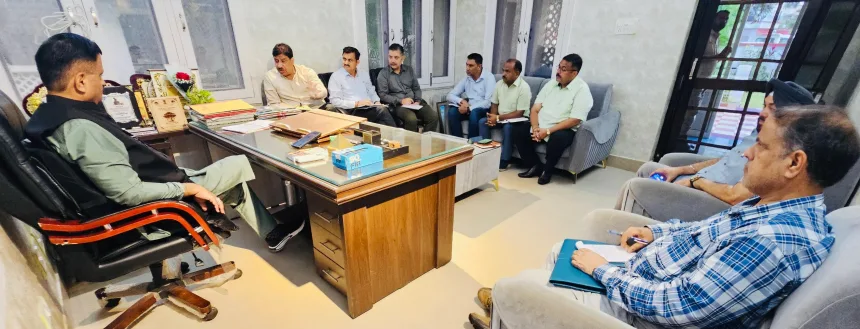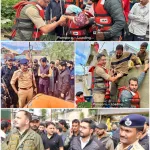Commends engineers for restoration of Tawi Filtration Plant
Calls for enhanced inter-departmental coord in implementing tribal welfare schemes
Jammu, Sep 04: In a continued demonstration of his unwavering commitment to ensuring safe and reliable drinking water for the people of Jammu Province—particularly the urban areas of Jammu—the Minister for Jal Shakti, Forest & Ecology, and Tribal Affairs, Javed Ahmed Rana, chaired the fourth consecutive daily progress review meeting here today.
Rana reiterated his commitment to ensuring that all efforts are directed toward mitigating the hardships faced by the people of Jammu and restoring normalcy at the earliest.
According to a statement issued here, the meeting focused on assessing the ongoing restoration of essential water infrastructure severely impacted by recent flash floods, incessant rainfall and widespread landslides.
During the meeting, the Minister reviewed the status of key water supply installations in Jammu city and appreciated the tireless efforts of the Public Health Engineering (PHE) staff and engineers.
He especially commended their work in successfully restoring operations at the Tawi Filtration Plant at Dhounthly, which resumed functioning late last night at 11:30 PM.
Emphasising the urgency of service delivery, he directed that potable water from the plant be supplied without delay to the areas of the Old City, including Panjthirthi, Mubarak Mandi, Ustad Mohalla, Kachi Chowani, Jain Bazar, and Jhulaka Mohalla.
The meeting also reviewed the status of the 600 mm diameter rising main from Sitlee to Lohar, which had been significantly damaged due to a major landslide in a remote forested area where access by machinery is not possible and manual transportation is the only viable option.
Rana instructed the concerned engineers to expedite restoration work and ensure full resumption of water supply along this line by tonight.
Assurances were also extended to residents in localities such as Janipur, Roopnagar, Bantalab, Keran Swarn Vihar, Muthi, and Indra Colony, who have faced intermittent water supply in the wake of the natural calamity.
The Minister confirmed that a consistent and reliable water supply to these areas will be restored starting tomorrow.
Meanwhile, Javed Rana, today held a detailed discussion with Chief Secretary, Atal Dulloo to review inter-departmental coordination and monitoring mechanisms related to tribal welfare schemes and development projects in Jammu & Kashmir.
The meeting was convened in the wake of the recent flash floods that have caused extensive damage across several regions, affecting tribal communities.
Expressing deep concern over the hardships faced by affected families, the Minister called for immediate and effective implementation of rehabilitation measures announced by the Government.
He emphasised that short-term relief is critical but there is a pressing need to develop long-term, sustainable strategy for the permanent settlement and protection of tribal populations vulnerable to recurring natural calamities.
He noted that administration’s response must be swift and anchored in structural reforms to reduce long-term vulnerability and ensure security and dignity of tribal life.
During the deliberations, the Minister highlighted several priority areas like timely disbursal of compensation for losses incurred by both individuals and communities, damage to private property and public infrastructure which require urgent attention.
He also called for rapid restoration of essential services in affected areas, stressing that delays in restoring basic amenities could deepen the distress of vulnerable populations.
Rana underscored the critical importance of a robust monitoring framework to ensure that inter-departmental tribal welfare projects are implemented without unnecessary delays.
He reiterated that efficient inter-departmental coordination is key to the success of developmental and relief initiatives and urged for the establishment of accountability-driven mechanisms to facilitate timely execution and measurable outcomes.
He also directed for aligning UT-level initiatives with the broader policy directives of NITI Aayog, particularly with regard to the mandated allocation of financial resources for tribal development.
He further stressed the need for targeted investment in infrastructure, healthcare, education and livelihood generation to create a strong and sustainable support system for tribal communities.






